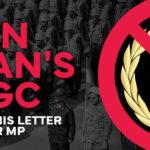The European Parliament passed a last-minute amendment to a report on Iran, condemning the Islamic Republic for Holocaust denial and anti-Israel hate speech.
With 590 in favour, 67 against and 36 abstentions, lawmakers at a plenary in Strasbourg, France, on Tuesday overwhelmingly backed the amendment, put forward by Dutch Liberal parliamentarian Marietje Schaake, that the house “Strongly condemns the Iranian regime’s repeated calls for the destruction of Israel and the regime’s policy of denying the Holocaust.”
Daniel Schwammenthal, director of the AJC Transatlantic Institute, the AJC’s EU office, said that “by clearly denouncing Tehran’s antisemitic policies and threats against Israel, the European Parliament has corrected, with a wide majority, one of the report’s most glaring shortcomings. We salute Parliament’s principled stand on this critical issue. Unfortunately, another crucial amendment calling for the immediate release of all political prisoners and an end to systematic torture and other improvements to the text were rejected.”
The report titled “EU Strategy towards Iran after the nuclear agreement” was compiled by British Labour MEP Richard Howitt, and approved in Tuesday’s vote 456-174.
European Jewish Congress President Dr. Moshe Kantor also praised the change.
“We welcome this amendment, as it is essential to couple Iran’s extremism, Holocaust denial and call for genocide with its nuclear program and relations with the international community,” he said. “It is vital that Iran is pressured to improve its human rights record and belligerency towards Israel and the region before the European Union resets its relations with the Islamic Republic.”
The president of the British Board of Deputies, Jonathan Arkush, said “Iran is a serial human rights abuser on a scale that is glaring and brazen. The strengthening of the European Parliament’s resolution was both necessary and welcome. What is also needed is a strengthening of sanctions to bring home to the pariah state of Iran that its abhorrent behavior will come at a heavy price.”
The document, which set principles for normalization of European Union relations with Iran following the agreement to lift sanctions from Tehran in exchange for the scaling back of its nuclear program, originally contained one single criticism of Iran, regarding its use of the death penalty. It did not mention Iran’s sponsorship of terrorism, support for Holocaust denial, or threats to destroy Israel.
In a debate on the report Monday night, several Members of the European Parliament blasted the original draft, which they said gave Tehran a free pass on its human rights violations, and support for Syria President Bashar al-Assad and terror organizations.
“Sadly, some in this house sought to rush to business as usual with Tehran, and to ignore or obfuscate the regime’s horrendous crimes against its own people and those in the region,” Schwammenthal said. “The European Parliament is an important voice in the defense of human rights, justice and freedom. If we compromise on our values in pursuit of our interest, we are likely to lose both.”
But Howitt said the Iran nuclear agreement was “a major achievement” for European and international diplomacy, and that “it is right that Europe honors its own obligations under the agreement, and that the same opposition we saw in the US Congress is faced down in Europe too.
“Critics of the report should be honest that in reality their opposition is to the agreement itself. And I will be honest with them by saying the true consequences of a breakdown in the agreement are a nuclear arms race in the Middle East, a victory for hardliners over reformists, impoverishment and a loss of hope for ordinary Iranian people, and fatally undermining diplomatic efforts to overcome the suffering, death and destruction in Syria and Yemen.”
The report endorses the restoration of a human rights dialogue between the EU and Iran, and gives priority to ending use of the death penalty for minors and for all drug-related offenses.
In several rounds of negotiations between the political groups, the text was revised by addressing Iran’s human rights abuses, external aggression, and support for terror organizations such as Hezbollah.
According to the Tehran Times, the Iranian Foreign Ministry welcomed the report, saying the move “depicts the European Parliament’s determination for expansion of ties with Tehran.”
Source: Jerusalem Post










